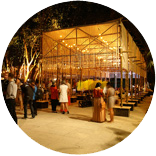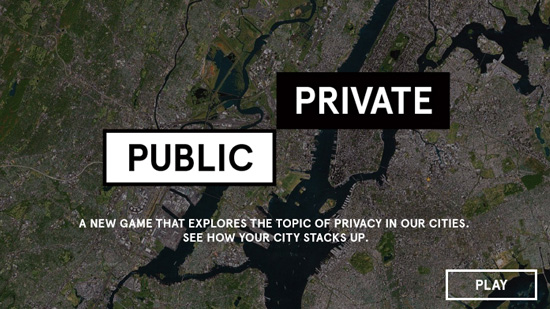News Release
BMW Guggenheim Lab Launches
Online Interactive Exploring Privacy
and Public Space
Launch Expands on Findings of Mumbai Labʼs Privacy Studies,
Released Today
NEW YORK, April 3, 2013 – The BMW Guggenheim Lab is expanding its exploration of privacy and public space in cities with todayʼs launch of a new online interactive. The feature, called “Public/Private,” is an extension of two research projects conducted over the past seven months as part of the BMW Guggenheim Lab Mumbai. Public/Private and selected results from the earlier projects, which included a privacy study and an initiative mapping perceptions of public spaces, are now available on the Labʼs website.
Public/Private invites users to share their expectations of privacy as experienced in a variety of spaces—ranging from home to work to recreational. Each participantʼs response will produce a unique visual graph that can be compared to feedback generated by other participants. As people from around the world add their insights, a more complex picture of privacy in urban settings will emerge. Public/Private was designed and developed by the New York-based design studio Collective Assembly.
The research projects explore the meaning and character of privacy for residents of Mumbai, one of the most densely populated cities in the world, with a metropolitan area of approximately 20 million people.
The first project, “Your Place, My Place, or Our Public Space?: Privacy and Spaces in Mumbai,” incorporates 1,300 in-person surveys conducted prior to and during the run of the Mumbai Lab. Responses to the survey, which explored the concept of privacy and its relationship to personal and public space, were solicited from a cross-section of Mumbaikars. The project was conducted by the Lab in a collaboration between Partners for Urban Knowledge, Action and Research (PUKAR), a Mumbai-based independent research collective, and Mumbai Lab Team member Aisha Dasgupta.
A second, complementary project, “Mapping Privacy in Public Spaces,” resulted in participants creating 250 “memory maps”—hand-drawn visual responses to images of public spaces in Mumbai. This participatory project was initiated by the Mumbai Lab in collaboration with the Design Cell at Kamla Raheja Vidyanidji Institute for Architecture and Environmental Studies (KRVIA).
“Your Place, My Place, or Our Public Space,” one of the first projects of its kind to address the topic of privacy and public space in Asia, found that the definition of privacy and the need for it are constantly shifting and that, faced with dense urban conditions, Mumbaikars find novel ways of using available space to meet privacy needs. Findings reveal that:
• While the majority of respondents considered “home” as their most private space, when asked from whom they seek privacy, 26% of Mumbaikars needed respite from their neighbors and 24% from their family.
• Although community spaces are typically considered “public” settings, they offer a level of intimacy and separation from family and neighbors that many homes in Mumbai lack. These spaces include beaches and parks as well as areas that may not typically be considered public such as cinema halls, malls, restaurants, and membership clubs.
• 87% of women surveyed reported that there are community or public spaces that are inacessible to them; these women cited safety and sexual harassment as their top concerns.
“Mapping Privacy in Public Spaces” corroborated findings from the “Your Place, My Place, or Our Public Space” study, demonstrating that:
• Most participants often found privacy in public spaces that contained an architectural element such as street furniture or playground equipment.
• Participants attained privacy in large open spaces such as seafront promenades and maidans (open spaces often used for sport or large gatherings).
• A sense of belongingness, security, ownership, seclusion, personalization of the space, accessibility, and freedom of expression were essential to fostering a sense of privacy in public space.
“During the last two years, the BMW Guggenheim Labʼs programs have encouraged people to take an active role in shaping their cities, but just as important may be the ability of city dwellers to find a sense of privacy within their urban environment,” said David van der Leer, curator of the Mumbai Lab. “The privacy studies initiated by the Mumbai Lab sparked a reimagining of how we think about and use precious public space in cities, and now, with the launch of our new interactive feature, we can open up the conversation to many other cities around the world.”
The BMW Guggenheim Lab Mumbai, open from December 9, 2012 to January 20, 2013, was located at the Dr. Bhau Daji Lad Museum, with an additional five satellite Labs throughout the city and its suburbs. The Lab presented 165 programs over 29 days and included design and research projects, surveys, tours, talks, workshops, and film screenings. The Labʼs programs were conceived by Mumbai Lab Team members Aisha Dasgupta, Neville Mars, Trupti Amritwar Vaitla, and Héctor Zamora, together with Guggenheim curator David van der Leer and curatorial assistant Stephanie Kwai. Locally based program consultants Swati Abhijit, Sourav Biswas, Vikram Doctor, Naresh Fernandes, Ammar Mahimwalla, Alisha Sadikot, Surabhi Sharma, and Pooja Warier, along with Paris-based program consultant Aaron Pereira, developed the programs based on the concepts identified by the Lab Team. Mumbai was the third stop for the mobile project, following presentations in New York and Berlin.
Futher research and findings from the Mumbai Lab continue to be collected and analyzed and will be released in the coming months.
As part of the Labʼs ongoing global dialogue about urban life, an exhibition to be presented at the Solomon R. Guggenheim Museum in New York this fall will consider the major themes and ideas that emerged in Mumbai, Berlin, and New York.
About the BMW Guggenheim Lab
The BMW Guggenheim Lab is a co-initiative of the Solomon R. Guggenheim Foundation and the BMW Group. The BMW Guggenheim Lab is curated by Maria Nicanor of the Solomon R. Guggenheim Museum. The project’s blog, Lab | Log, features interviews with BMW Guggenheim Lab contributors and includes coverage of the Lab’s activities. The public is invited to join the BMW Guggenheim Lab’s dedicated social communities on Twitter (@BMWGuggLab and #BGLab), Facebook, YouTube, Flickr, and Foursquare, and to subscribe to the Lab's e-newsletter for the latest project updates.
Contacts
Mumbai:
Neeti Sharma, Ruder Finn India
+ 91 981 9958 140
This e-mail address is being protected from spambots. You need JavaScript enabled to view it
International:
Lillian Goldenthal, Polskin Arts & Communications Counselors
1 212 593 6355
This e-mail address is being protected from spambots. You need JavaScript enabled to view it
For BMW-related inquiries:
Thomas Girst, Head of Cultural Engagement, BMW Group Corporate and Intergovernmental Affairs, BMW Group
+49 89 382 20067
This e-mail address is being protected from spambots. You need JavaScript enabled to view it
For complete press materials, go to bmwguggenheimlab.org/presskits
For publicity images, go to bmwguggenheimlab.org/pressimages
For publicity videos, go to bmwguggenheimlab.org/pressvideos
User ID = photoservice, Password = presspass
April 3, 2013
#1295/BGL28


